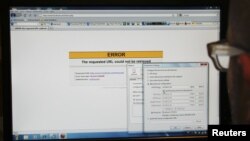According to Google Trends, the search term “hotspot” (referring to free proxy software Hotspot Shield) has surged 1,200 percent in the past seven days inside Syria. “Proxy” and “Tor” (a client to make web surfing anonymous) spiked 750 percent. They are rarely, if ever, on the top ten list of search terms.
Part of the reason for the surge may have been news that broke last week that one of the most popular proxy clients, Green Simurgh, which is used widely to conceal Internet identity in Syria and Iran, may have been compromised. ComputerWorld reported that copies of Green Simurgh had been found to contain Trojan malware that records usernames, passwords and sites visited, and logs every keystroke. So, overnight, the tool most widely used to protect web users became their worst enemy. Many Syrians are scrambling for alternatives.
More secure options
Psiphon, a Canadian software company, has developed an open source client as part of their suite of tools called Psiphon 3. According to their website, “Psiphon 3’s client-based architecture enables advanced circumvention logic and complete IP protocol tunneling that’s not possible with a web rewriting proxy.”
Put simply, Psiphon 3 is a Windows-based client that uses a tunneling technique that toggles between several different secure protocols in order to keep a user’s browing habits anonymous. The software operates on a flash drive and can be pulled out if a user feels their identity has been compromised. (disclosure: Psiphon is funded in part by VOA’s parent agency, the Broadcasting Board of Governors)
Speaking with VOA, Psiphon CEO Rafal Rohozinski said that the firm has been deploying Psiphon 3 through their on-the-ground networks in Syria since January 2012. An independent analyst who specializes in Syrian circumvention issues but requested anonymity for his safety told VOA that in the last two weeks the number of logged in users has surged to as many as 20,000 to 40,000 Syrians daily. Psiphon data also indicates that users stay logged in securely from 10 minutes to up to an hour, suggesting that the service is being used for video, voice and text chat.
Part of the reason for the surge may have been news that broke last week that one of the most popular proxy clients, Green Simurgh, which is used widely to conceal Internet identity in Syria and Iran, may have been compromised. ComputerWorld reported that copies of Green Simurgh had been found to contain Trojan malware that records usernames, passwords and sites visited, and logs every keystroke. So, overnight, the tool most widely used to protect web users became their worst enemy. Many Syrians are scrambling for alternatives.
How to Download Psiphon 3
How to download Psiphon 3- Open your web browser and log on to a web-based e-mail service that has a secure web connection by default such as Gmail. (This means, use a web-based service but MAKE SURE https:// not http:// is in the address bar.)
- After you are securely logged in, e-mail get@psiphon3.com to receive a link to download the client to your computer. Do NOT do this from an e-mail client such as Microsoft Outlook or Thunderbird or the mail client on your mobile phone. Again, use https://.
- Follow the instructions and install the program. Psiphon 3 only works on Windows-based systems but the open source project says they are working for versions that work on Mac OS X and Android-based phones.
More secure options
Psiphon, a Canadian software company, has developed an open source client as part of their suite of tools called Psiphon 3. According to their website, “Psiphon 3’s client-based architecture enables advanced circumvention logic and complete IP protocol tunneling that’s not possible with a web rewriting proxy.”
Put simply, Psiphon 3 is a Windows-based client that uses a tunneling technique that toggles between several different secure protocols in order to keep a user’s browing habits anonymous. The software operates on a flash drive and can be pulled out if a user feels their identity has been compromised. (disclosure: Psiphon is funded in part by VOA’s parent agency, the Broadcasting Board of Governors)
Speaking with VOA, Psiphon CEO Rafal Rohozinski said that the firm has been deploying Psiphon 3 through their on-the-ground networks in Syria since January 2012. An independent analyst who specializes in Syrian circumvention issues but requested anonymity for his safety told VOA that in the last two weeks the number of logged in users has surged to as many as 20,000 to 40,000 Syrians daily. Psiphon data also indicates that users stay logged in securely from 10 minutes to up to an hour, suggesting that the service is being used for video, voice and text chat.
